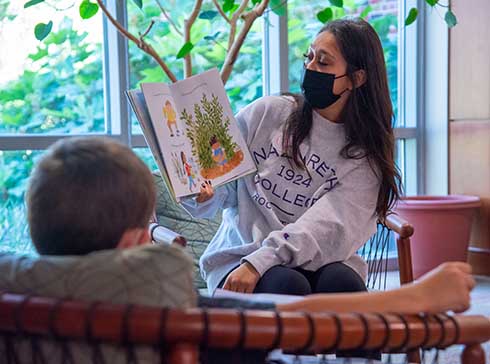RISE aims to strengthen and diversify the early childhood workforce
While early-intervention services improve the long-term health, educational, and social outcomes for children with disabilities, provider shortages mean access is often denied. Nazareth College has responded to a clear community need with a new graduate early-intervention interprofessional concentration (track) called Rochester Scholars for Early Intervention — known as Project RISE — that is designed to strengthen the early childhood workforce and to promote the development and well-being of young children (ages 0-8) and children with different abilities. Nazareth is uniquely positioned to contribute to workforce development efforts as it is the only regional college with a broad mix of allied health and early childhood education courses offering this specialized interprofessional concentration.
“Workforce development is critical to successful outcomes. We must have a workforce that is ready to work with children with different abilities and reflect the diversity of children served,” said Jackie Campbell, executive director of Roc the Future, a nonprofit alliance in Rochester, N.Y., dedicated to improving outcomes for every child in the local community. “We commend Nazareth College for their foresight to create a new early-intervention interprofessional concentration that prepares graduate students to more authentically connect with and serve a diverse family population.”
Project RISE is an interprofessional collaboration of Nazareth’s School of Education and College of Health and Human Services and is an option for prospective and current graduate students in inclusive early childhood education and in allied health programs — art therapy, music therapy, physical therapy, social work, occupational therapy, and speech-language pathology — who want to work with young children and families in health care, education, or social service settings. “Nazareth graduate students in Project RISE can specialize their skills as a teacher or an allied health professional such as a speech-language pathologist, social worker, or music, art, or physical therapist. Through this program, students become advocates for a child and family,” says Susan Sturm, assistant professor and director of the graduate inclusive early childhood & childhood education programs in the School of Education.
Monroe County’s Department of Public Health is a community partner that knows the strong need for providers. “What an amazing opportunity for students to learn how rewarding it can be to use their skills and expertise to advocate for and empower families,” said Roxana Inscho, Special Children’s Services Administrator, Monroe County Department of Public Health. “We know that infants and toddlers learn best through everyday experiences with their parents and caregivers but few students get the opportunity to learn about providing services to this population in natural settings. There is currently such a need for providers, and especially diverse providers of Early Intervention services in our community.”
A key component of Project RISE is support for racially-diverse graduate students in education and allied health programs with the goal of addressing provider shortages as well as diversifying the workforce. “The current workforce locally and across the state is not representative of the children and families being served,” said Lisa Hiley, assistant professor in communication sciences and disorders and coordinator of the developing child and families minor. “Disproportionate representation can reduce provider-client trust, result in over-representation of minority groups in special education, and drive further distrust of a system that has historically marginalized children and families of color.”
The grant includes a co-op experience which is a paid, work-based enhancement that goes beyond a traditional internship. The RISE Co-Op is designed to make the realities of graduate school more financially feasible for students who often balance graduate school with employment or who often must borrow money for living expenses while they are completing degrees. Beyond a pay that is above a liveable wage rate, the RISE scholars would have access to work that would expand their experience and professional network. The RISE Co-Op includes mentoring, affinity groups, tutoring, writing support, and professional networking offered to promote equitable experiences for minority students. "Mentoring, affinity groups, and professional networking opportunities are included to increase the sense of support and belonging for minority and/or non-traditional students" said Rupert Johnson, assistant professor of communication sciences and disorders and RISE scholar advisor.
RISE Scholars will be recruited and enrolled in the program during Spring and Summer 2022. As soon as Spring 2023, the first cohort of RISE scholars will be prepared to advocate for change, to work with families in culturally responsive and trauma-informed ways, and to promote the overall development and well-being of young children (0-8 years), and children with different abilities. Funding for Project RISE is provided by a grant from the Mother Cabrini Health Foundation, and by Florence M. Muller Foundation funding.
Contact
Julie Long | Senior News & PR Officer | jlong2@naz.edu | (585) 389-2456 | (585) 781-8186 (cell)
Nazareth University is an inclusive community of inspired learners, educators, and changemakers who for 100 years have been driven by a bold commitment to action, empathy, equity, and leading innovation for the common good. Impact experiences are at the heart of a Nazareth education, preparing each student to discover within themselves the potential to cultivate positive change in their life's work, in any career field, and in a world that is constantly evolving and infinitely interconnected.
Our broad academic offerings present a range of study options typical of larger universities, yet achieved in our supportive campus culture. Nearly 2,100 undergrad and 600 graduate students enroll in degree and certificate programs and engage in collaborative, transformative learning experiences, preparing for the professions and society of today and tomorrow. In a learning community that purposefully integrates liberal arts and professional programs, Nazareth University graduates are able to launch a lifetime of impactful leadership in communities and workplaces near and far.
